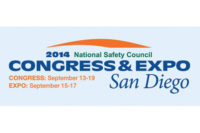 Monday morning October 22 at the National Safety Congress in Orlando, we had the opportunity for an exclusive one-on-one, sit-down interview with Chesley Sullenberger III. Captain “Sully” successfully ditched US Airways Flight 1549 in the Hudson River with no loss of life after its initial climb out of New York City on January 15, 2009, was disabled due to striking a flock of Canada geese.
Monday morning October 22 at the National Safety Congress in Orlando, we had the opportunity for an exclusive one-on-one, sit-down interview with Chesley Sullenberger III. Captain “Sully” successfully ditched US Airways Flight 1549 in the Hudson River with no loss of life after its initial climb out of New York City on January 15, 2009, was disabled due to striking a flock of Canada geese.
What is the most important takeaway from your second book, published in May 2012, “Making a Difference: Stories of Vision and Courage from America’s Leaders?
Everything is dependent upon leadership. Effective, authentic leadership, starting with real core values that you actually act on and put into practice. These core values have to be something that everyone in the organization understands and resonates with. And even if they cannot clearly articulate them, they and the organization know when they are operating in accordance with them, and even more important, when they are not. They know how things should be, and they know when they are not as they should be.
I think that’s where leadership starts. Leadership also, in addition to really making it real, the core values for the organization, must create a culture, an effective, collaborative safety culture. And the most effective companies do that, and it is palpable. You can feel the collaboration between management and the front line workers. So you need top-down leadership and bottom-up front line engagement.
The third and final takeaway regards what some deride as soft as opposed to hard skills. I don’t like that terminology. I think these skills, the leadership, the teambuilding, the interpersonal communication, decision-making skills, these are human skills. We have proved in aviation and are now proving in patient safety that these human skills have the potential to save more lives than technical skills.
You have a master’s degree from Purdue University in industrial psychology . How would you describe the most typical psychological traits of American CEOs in 2012?
Well, let me quote my friend and longtime USC Professor Warren Bennis, who has written some 30 books on leadership and still blogs for one of the major business publications. As a very young man at the end of World War II he was an Army infantry officer. He said that was the best training, the best life experience he’s ever gotten. Again, it is about core values, about what’s really important.
So let me answer your question by turning it around and giving it a more positive, a more hopeful direction. Warren says American companies for the most part are over-managed and under-led. He also says that when leaders treat followers with respect, followers respond with trust. I think those kinds of findings are really at the core not only in what goes on in American business but in global business interactions. It is what happens and what should happen.
A common theme throughout my second book comes across in each of interviews with these people I’ve chosen, because I’ve admired them, because they have exhibited moral courage. They consistently say, in their own words, in very personal stories, that ego is often a leader’s worst enemy. That one must be able to check one’s ego at the door when one comes to work. One must do things that are in accordance with the core values for the right reasons. The “why” of something, an order, a policy, is always important. Motivation is always important. We should be doing it for the greater good of the organization and the society, and not only for our own personal needs, our own personal aggrandizement.
In the Air Force, you were a member of an accident investigation board. What is the most important lesson you learned from investigating accidents?
I did one (investigation) in the Air Force and two as a pilot’s union accident investigator and safety chairman. The most important lesson is how important the human factor is. In many domains (job functions), you can have perfect engineering, you can have well-built machinery, but if you don’t take into account who uses it and how they use it, If you don’t take into account the context in which the processes occurred, if you don’t design the quality and safety into the very fabric of the organization, into the very framework of your processes, you can’t achieve the best outcomes. So the human factor is always critically important. And that is something we have begun to address in really effective ways in the past 20-25 years in aviation.
The safety management system concept, SMS, in aviation shows great promise as a way of formalizing, of making transparent safety in a holistic way throughout the entire organization. Instead of doing ad hoc initiatives aligned by function or by department, with the SMS concept it makes safety a core business function on par with financial considerations. It holds management at every level of the organization responsible for safety, so it’s imperative our leaders have been taught the science of safety, and when they lack subject matter expertise solicit, listen to, and act on brutally honest advice from subject matter experts.
Leaders at the least should be very careful observers of accident investigations, and part of what we have in aviation in the NTSB (National Transportation Safety Board) model is a formal lessons learned process. In which there are findings and contributing factors, in which specific recommendations for improvements are made. These results are both widely disseminated but also locally actionable.
Tomorrow: Part II of ISHN Chief Editor Dave Johnson's interview with Captain Chesley Sullenberger III: What are "error inducing contexts"?



